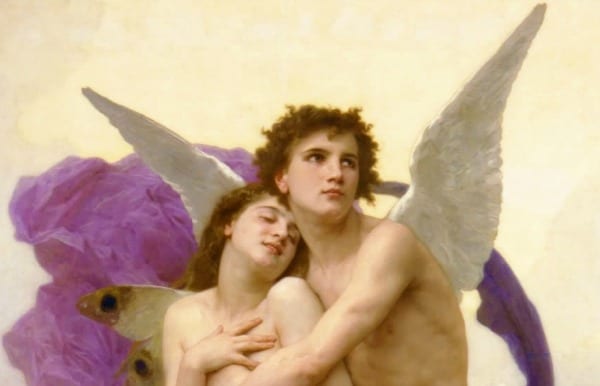Psyche and Cupid: the ancient story with a happy-ever-after
Psyche and Cupid: the ancient story with a happy-ever-after
Psyche and Cupid: the ancient story with a happy-ever-after
-
Hannah
-
Hannah


Researching my latest novel, Aphrodite’s Tears, was an absolute pleasure, for it involved reading up on ancient mythology. I was especially interested, as the novel’s title conveys, in stories of the gods; but as my heroine Oriel points out in the book, so many of the stories of the ancient civilisations end in tragedy. Not so, I am glad to share, for my favourite love story inspired by mythology, that of Cupid and Psyche.
Cupid was the Roman god of desire, erotic love, attraction and affection, and his Greek counterpart was Eros. Psyche is Greek for ‘soul’ (hence the use of the word in modern times in relation to psychoanalysis). The story of Cupid and Psyche was first committed to paper in the second century AD by the Roman writer Apuleius, but in fact the tale of Eros and Psyche dated back much further, as evidenced by depictions in Ancient Greek art.
The story of Cupid and Psyche, as written by Apuleius, is long and detailed, but here is a condensed version:
The story begins with a beautiful princess. So beautiful, in fact, that the goddess Venus is threatened by her. How dare the mortals admire this Psyche rather than her? Venus orders her son, Cupid, to deal with Psyche by using one of his arrows to make her fall in love with a monster. But he scratches himself with his own arrow, and when he sees Psyche he falls completely, irrevocably in love with her.
Psyche’s father, meanwhile, goes to see the oracle of Apollo to ask why Psyche has not found love like her two sisters. The oracle’s answer: she will be taken by a fearsome dragon-like creature and bear his monstrous offspring. Her father is horrified, but apparently resigned to her fate. He leaves her, dressed in funeral attire, in a rocky crag, to be claimed.
The West Wind bears Psyche to a meadow, where she finds a beautiful and luxurious house of gold. There she is to live, alone – but for a ghostlike presence which makes itself known through whispers. That night, the monster comes to her in the darkness and makes her his wife. She cannot see him, she can only feel him. He comes to her every night, but is gone by sunrise.
He, of course, is no monster. He is Cupid.
Meanwhile, Psyche’s family has become concerned about her fate. Cupid allows the West Wind to bring her sisters so that they may see she is safe – and happy even, for she is with child. The sisters are awed by the luxury in which they find Psyche living, and very, very curious about the monster who is her husband. ‘You have not seen him – not ever?!’ they exclaim when Psyche tells them all. With their cajoling, she decides that really is a situation that must be remedied.
So comes the night that Psyche hides a lamp in her bedroom, and lights it once her husband is sleeping. But it is no monster she sees in the light; it is the most attractive man she has ever seen. In her shock, she stumbles, spilling oil from her lamp. The commotion awakens Cupid – and discovering he has been outed, he flees.
Psyche is left alone, heartbroken for her lost love, wandering the land in search of him. Ultimately, she is drawn to the gods, and she helps in temples dedicated to Ceres and Juno – and then, Venus herself. Venus is gleeful that she may punish Psyche: she beats her and mocks her, and then sets her a series of apparently impossible tasks. For each task, however, Psyche receives help, arranged by Cupid, from wildlife and even other gods who take pity on her; until during her final trial, when she must collect a box containing beauty from the queen of the underworld, she falls unconscious.
It is Cupid who finds Psyche, Cupid who awakens her, Cupid who appeals to Jupiter that he and Psyche be permitted to be together, in peace. Eventually, Jupiter agrees. Venus is told in no uncertain terms to leave the lovers alone; Psyche is given ambrosia, that she may be immortal as a goddess; and all the gods celebrate the official marriage of Psyche and Cupid with a huge banquet.
The story of Cupid and Psyche has been inspiring romantics ever since it was rediscovered during the Renaissance. Pictured with this article is part of a painting by French artist William-Adolphe Bouguereau, painted in 1895. Many other artists have painted depictions of the lovers, including Raphael, Goya and John William Waterhouse. Writers, too, have been inspired by this ancient story, penning plays, poems and novels in which they interwove details from the legend. Few people realise that the fairy tale Beauty and the Beast is in fact an adaptation of part of the Cupid and Psyche story.
I will leave you with one of my favourite works inspired by the Ancient Greek myth: ‘Ode to Psyche’ by John Keats, in which the narrator is determined to worship Psyche as a goddess.
Thanks for sharing the story of Psych and Cupid.